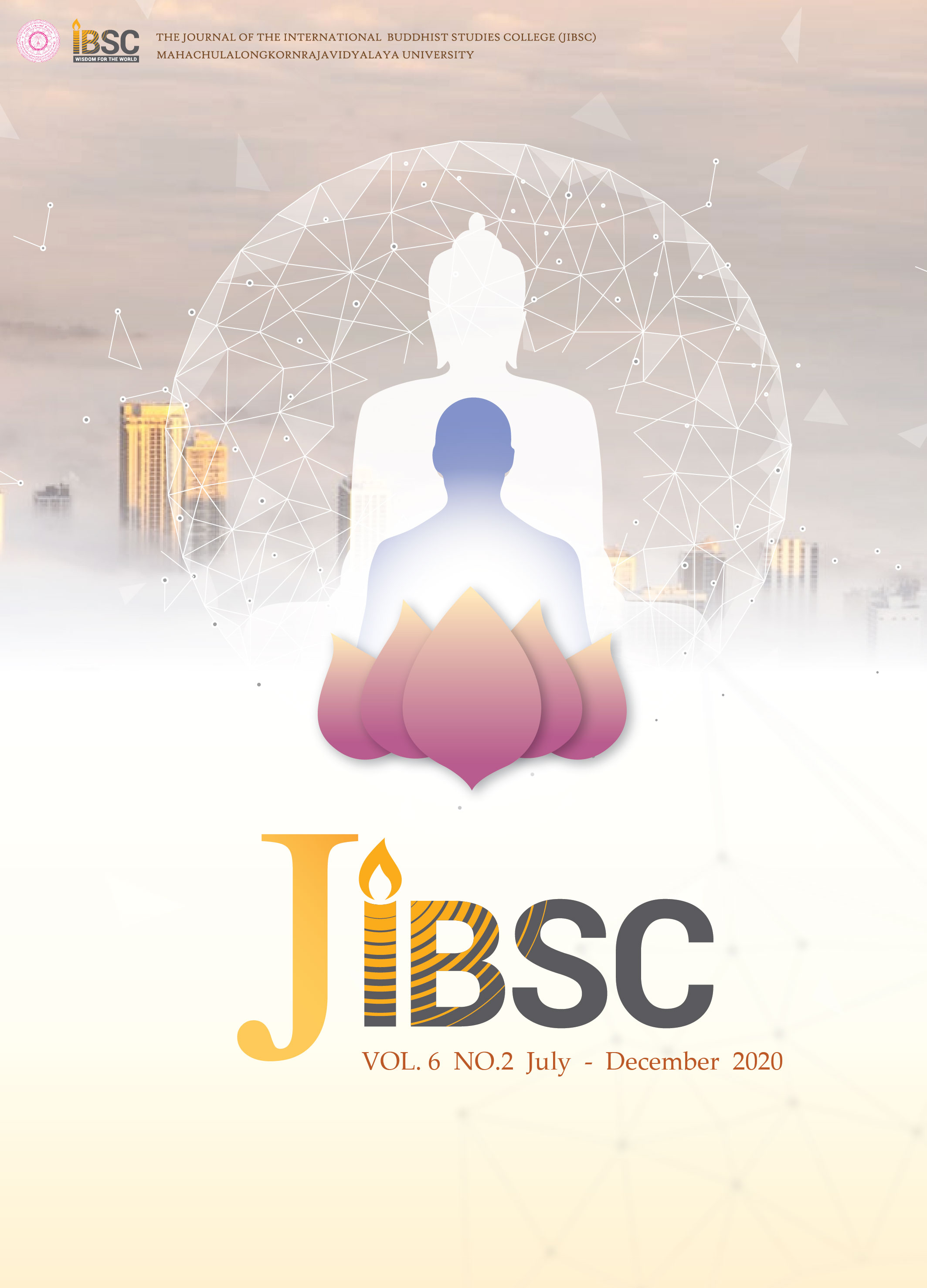A Buddhist Approach to Stress Management from the Perspective of Dependent Origination (DOSM)
Main Article Content
Abstract
The purpose of this article aims to understand the Buddhist view to the stress management by analyzing the conceptual framework of the Dependent Origination (paṭiccasamuppāda).
Four noble truths as taught by the Buddha says, the life is full of stress (dukkha), there is a cause of this stress, it is possible to stop stress, and there is a way to stop stress by following noble eightfold path. The deeper explanation of stress is given by the Buddha in Paṭiccasamuppādasutta, which include explaining detailed nature of stress and describing the evolution or lifecycle of the all living beings.
Dependent Origination model is presented in the Tipiṭaka in two ways: general presentation, which do not specify each factor separately and detailed presentation, which describes and analyses each factor separately and comprehensively. This paper has been used both approaches to expound the causes and possible solutions to relieve and release of stress. Answer of possibilities in managing stress through Dependent Origination, contains some theoretical and practical ideas, which are possible implemented to the practice in perspective of self-help or professional therapy.
Article Details
The Journal of TCI is licensed under a Creative Commons Attribution-NonCommercial-NoDerivatives 4.0 International (CC BY-NC-ND 4.0) licence unless otherwise stated. Please read our Policies page for more information on Open Access, copyright and permissions.
References
Bhadantācariya, Buddhaghosa. 2010. The Path of Purification (Visuddhi-magga). Colombo: BPS.
Baum A. 1990. “Stress, Intrusive Imagery, and Chronic Distress.” Health Psychology, vol. 6, (September): 653-675.
Bodhi Bhikkhu. 2000. The Connected Discourses of the Buddha. A New Translation of the Saṃyutta Nikāya. Boston: Wisdom Publication.
Bodhi Bhikkhu. 1980. Transcendental Dependent Arising: A Translation and Exposition of the Upanisa Sutta. Kandy: Buddhist Publication Society.
Chilnick Lawrence. 2008. Heart Disease: An Essential Guide for the Newly Diagnosed. USA: Perseus Books Group.
Feer, M. Leon (ed.). 1970. Saṃyutta Nikāya, vol. I. Oxford: PTS.
Feer, M. Leon (ed.). 1991. Saṃyutta Nikāya, vol. II. Oxford: PTS.
Caroline A. F., Rhys Davids, M. A. 1900. Dhamma-Sangani (Compendium of States or Phenomena). London: Royal Asiatic Society.
Chan Khoon San. 2006. Buddhism Course. Malaysia: Chan Khoon San Publication.
Chilnick Lawrence. 2008. Heart Disease: An Essential Guide for the Newly Diagnosed. Philadelphia: Perseus Books Group.
Health and Safety Authority. 2019. “Work-Related Stress: A Guide for Employers.” https://www.hsa.ie/eng/Publications_and_Forms/Publications/Occupational_Health/Work_Related_Stress_A_Guide_for_Employers.pdf.
Harvey Peter. 1993. “The mind-body relationship in Pali Buddhism: A Philosophical Investigation”. Asian Philosophy, vol. 3, no. 1: 29-41.
Ledi Sayādaw. 1984. Maggaṅī Dīpanī: A Manual of the Path Factors. England: Association for Insight Meditation.
Leifer Ron. 1997. The Happiness Project. USA: Snow Lion Publication.
Mark Clark. 2009. Introduction to Army Leadership. USA: Pearson Custom Publishing.
Mehm Tin Mon. 1995. The Essence of Buddha Abhidhamma. Yangon: Mya Mon Yadanar Publication.
Ñāṇaponika Mahathera (Siegmund Feniger). 1949. “Abhidhamma Studies: Researches in Buddhist Psychology”. Island Hermitage Publication, no. 2: 87.
Neil Schneiderman, Gail Ironson, and Scott D. Siegel. 2005. “Stress and Health: Psychological, Behavioral, and Biological Determinants”, Annual Review of Clinical Psychology, vol. 1: 607-628.
Norman B. Anderson, Cynthia D, Steven J. Breckler and others. (2015). “Stress in America: Paying With Our Health”. The Annual Nationwide Survey in America Report. (February). http://www.apa.org/news/press/releases/stress/2014/stress-report.pdf.
Piya Tan (tr.). “(Paṭiccasamuppāda) Vibhaṅga Sutta. The Discourse on the Analysis (of Dependent Arising)”. http://dharmafarer. org/wordpress/wp-content/uploads/2009/12/5.15-PaticcasamuppadaVibh-anga-S-s12.pdf.
P. A. Payutto. 2011. Dependent Origination: The Buddhist Law of Conditionality. Bangkok: Chandrapen Publishing House.
Wallenstein Gene. 2003. Mind, Stress and Emotion: The New Science of Mood. Boston: Commonwealth Press.
Wolfgang Linden, Joseph W. Lenz & Andrea H. Con. 2009. “Individualized Stress Management for Primary Hypertension: A Randomized Trial”, Arch Intern Med, vol. 161 (August): 1071-1080.


